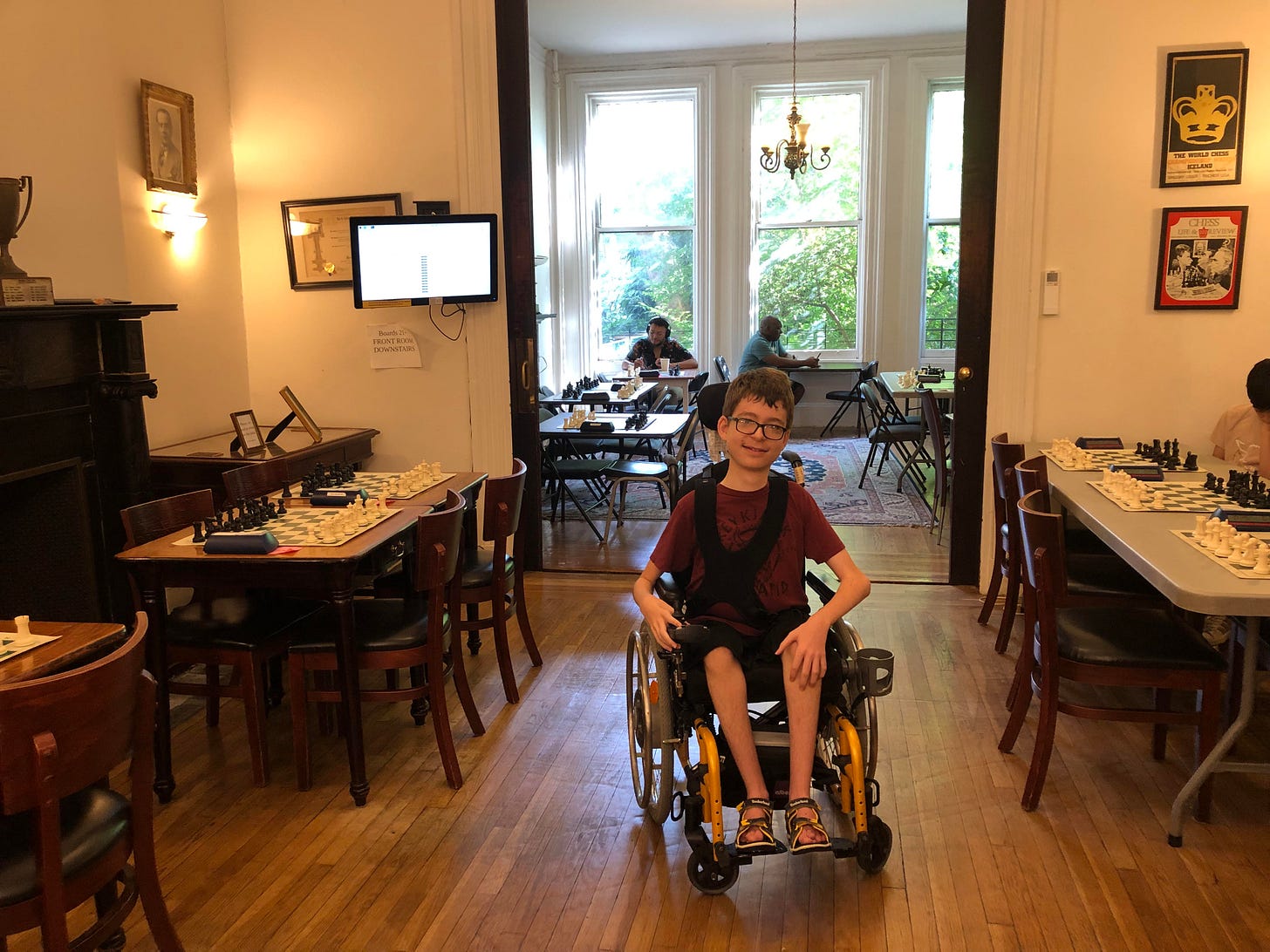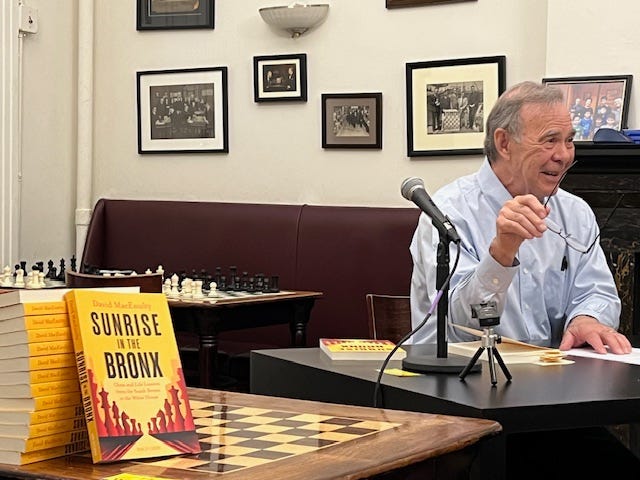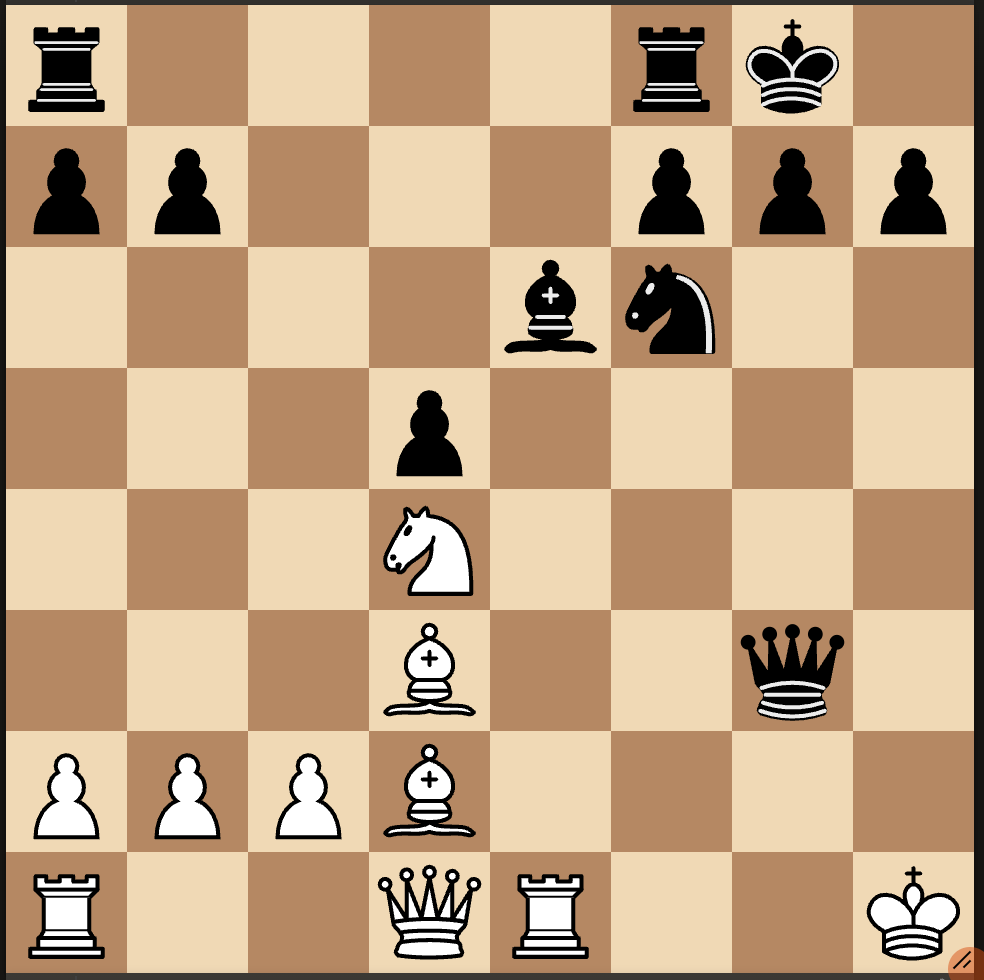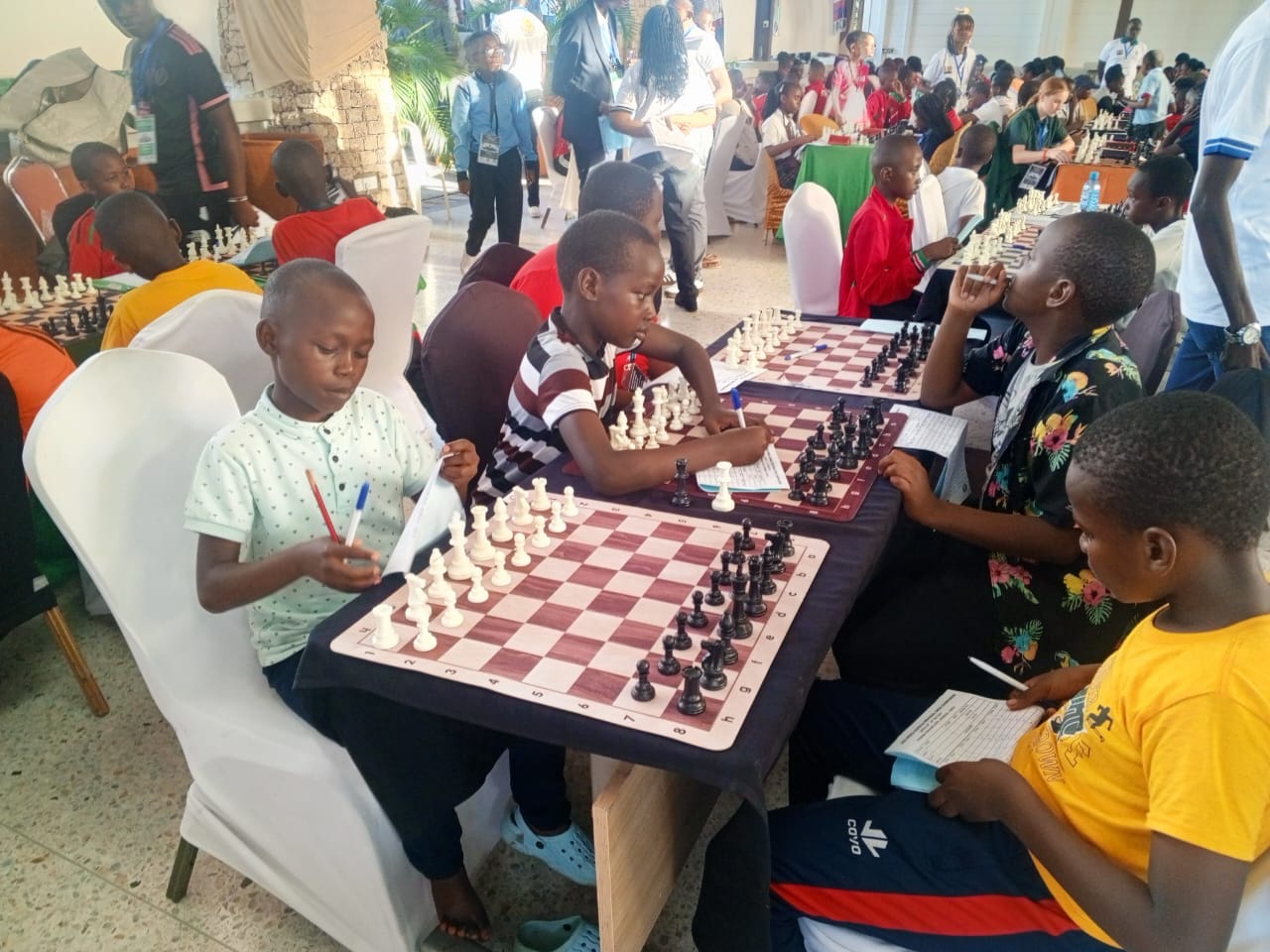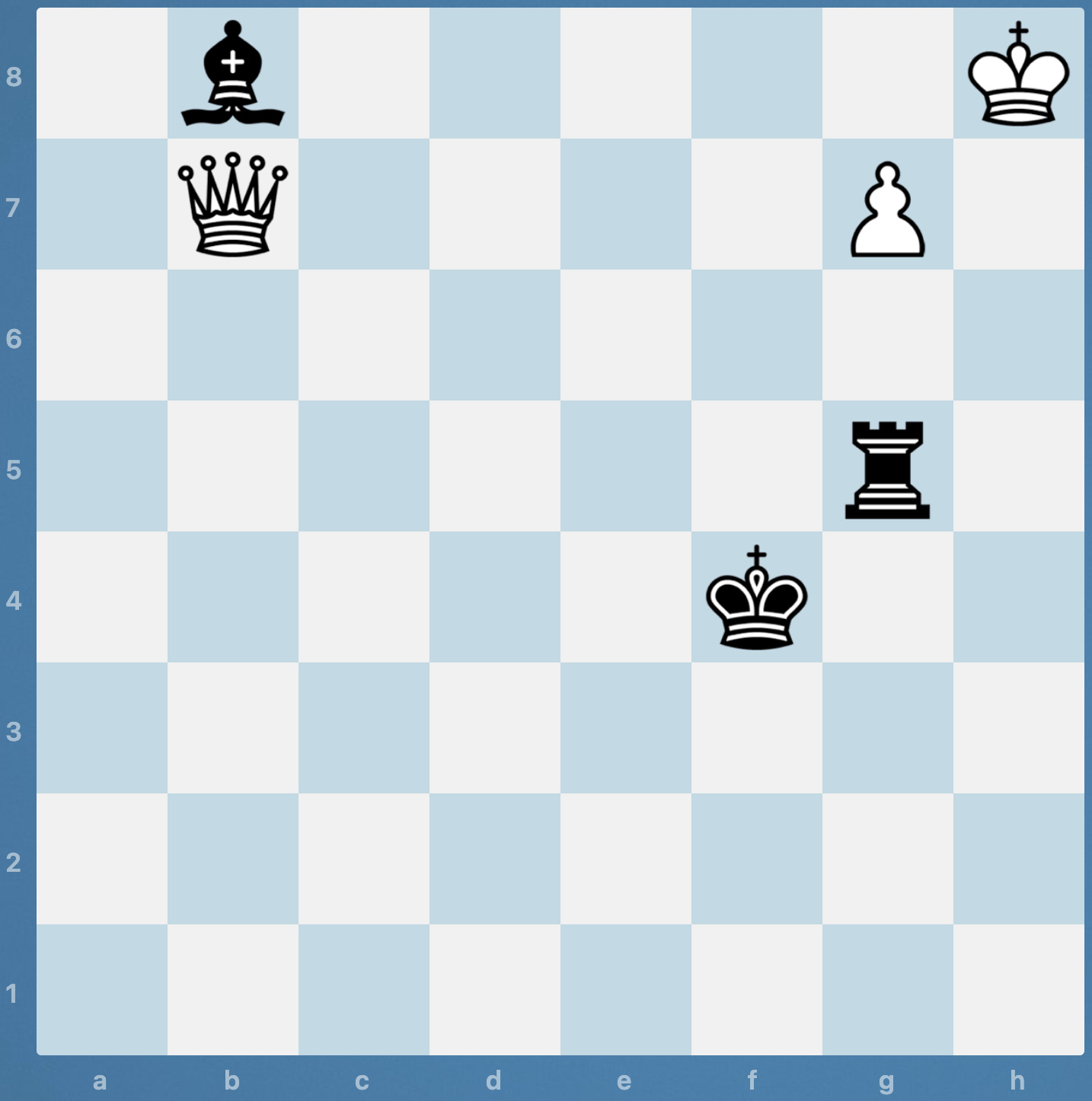In This Issue: Farewell! by Club President Sarathi Ray From The Skittles Room Recent Games Analyzed, by GM Aleksandr Lenderman Kibera Knights go to Mombasa, by Ken Kaplan Chess Toons En Passant Problems, Problems, curated by Alexander George Editor's Note
Dear members,
It was a great honor to be elected president of the Marshall Chess Club four years ago and it has been a privilege to work for the club we all love. But as I recently began a new position in my professional career and have less time to dedicate to the Marshall, I have decided not to run as president for the upcoming term. It’s a bittersweet moment for me and I will miss being in a leadership role at the Marshall, but it is the right time to pass on the baton.
The Board recently welcomed several new members, who are all highly capable and I know they will work hard for the club. Next week the Board will elect a new president. There are two strong candidates for the position, both of whom I respect, Luka Glinsky and IM Sal Matera. Sal was my vice president for many years and has proven himself an articulate, level-headed and knowledgeable advocate for the club and its members.
During my tenure as president, I worked very hard to make all members and visitors feel welcome. I want to share a letter I received a year ago from Ima Jonsdottir, the mother of USCF expert Oskar Zoffer, who uses a wheelchair and lives in Boston.
Ima's letter beautifully articulates my passion and dedication to the Marshall Chess Club in a way that I never could. It has been a truly rewarding experience to serve as the club’s president for these last four years.
Ima Jonsdottir
Mon, Aug 5, 2024
Good morning, Sarathi and Carlos,
We got back to Boston (Newton) late last night after a memorable NYC weekend and woke up today feeling so grateful for everything you did to make Oskar feel welcome at the Marshall Chess Club. He had a great time and is excited to come back again.
To be perfectly honest, from our perspective we were not necessarily expecting this to work out. Sarathi, when you started asking me what could be done and sent me measurements, I realized you were determined and that it was not time for us to give up on this dream. We are pretty used to not being able to get into places and after a decade plus of dealing with it we don’t always have the energy to push. You not only made it easy by communicating with us, but you also completely took responsibility off our shoulders with your determination and actions. I can’t quite express what that means to people like us who regularly face the normalization of exclusion and are sometimes too exhausted to advocate to change it, so your willingness to make this work was a very big deal.
We are also super excited for other chess players who use a wheelchair who can now also enter the Marshall Chess Club :)
Carlos, thank you for introducing yourself to us after the tournament, it was nice to meet you, and you certainly made Oskar and us feel so welcome.
Thank you both!
Ima
Oskar’s mom
Welcome back, fellow chess players, to this edition of the Marshall Chess Club's fortnightly bulletin, The Marshall Spectator.
Last week we were thrilled to host legendary Chess Coach, accomplished writer, and Marshall Chess Club member David MacEnulty for an author talk and book signing of his book: Sunrise in the Bronx.
The evening was well attended, and featured a Q and A as well as many anecdotes from his experience as one of the most accomplished scholastic chess coaches in the country. If you were unable to attend, you should be able to view the event on our replay page soon and stop by the office to purchase a copy of his book while supplies last!
We also held a Chess960 event last Friday that was well attended and featured many strong players, including GM Andrew Tang, as well as our club champion, IM Mykola Bortnyk, who won the tournament.
In other member news, we're excited to share an update to our member highlights. Congratulations to each one of these members for their accomplishments in May, and keep an eye out for showcases of their accomplishments around the club. Good luck to everyone vying for a highlight in June!
Top USCF Rating Gain: Kenny-Maheux, Victor (364 rating points gained) Most Active Member: Jay Bonin (12 tournaments attended) Most Active New Member: Minkin, Garold and Razygraev, Grigory (6 tournaments attended each.)
Curious to see where you stack up? You can see the full list here.
Looking further ahead on the calendar, we will once again be hosting some of the best chess camp programming in New York City.
Summer Camps officially start on June 16! Thanks to the Tournament and Membership Committees, we are excited to share that for kids who register for multiple weeks of camps, we will have special prizes! See below:
2 weeks: Marshall Chess Academy T-shirt 3 weeks: MCC Tournament Credit into select tournaments 4 weeks: A complimentary yearly scholastic Marshall Chess Club Membership
If you have any questions about our camps, you can email Kevin at kevinf@marshallchessclub.org and he will do his best to work with you on this.
Looking back over the last two weeks, we have had a plethora of events for our members to participate in.
The Thursday Action on June 5 had 40 players registered and was won by IM Michael Song who scored a perfect 4 out of 4 to win the first place $150 prize. FM Marcus Miyasaka and FM Megan Paragua scored 3.5 out of 4 to win $87.50 each, while Jose De Villa scored 3 out of 4 to win $75. Kathleen De Villa and Brian Gilbert scored 2.5 out of 4 to win $37.50 each.
The Afternoon Game 50 on June 5 had 4 players registered and was won by IM Justin Sarkar, who scored a perfect 2 out of 2 to win the $15 first-place prize.
The Sunday Game 50 Open on June 1 had 61 players registered and was won by GM Michael Rohde and IM Jay Bonin, who scored 4 out of 4 to win $265 each. Kathleen Joy De Villa scored 3.5 out of 4 to win $118, and Harrison Cai also won $118 for his 3 out of 4 score.
The Rated Beginner Open on June 1 had 41 players registered and was on by Anderson Antoine, Alston Lin, Kalonjee Gallimore, Penelope Long, and Edgar Lievano, who scored 3 out of 4 to win $102.60 each.
The Saturday Game 50 Open on May 31 had an even 30 players registered and was won by FM Joshua Colas, who scored 3.5 out of 4 to win $180, and GM Michael Rohde, IM Jay Bonin, and Derek Zhang scored 3 out of 4 to win $40 each. The following 5 players won $18 each for their 2.5 out of 4 score: Lucas Lu, Grayson Xiang, Noah Gillston, Grant Liu, and Thomas Egelhof.
The Saturday Game 50 Under 1800 on May 31 had 64 players registered and was won by Manish Suthar and Alex Vivado who scored a perfect 4 out of 4 to win $320 each, while the following 6 players won $32 each for their 3 out of 4 score: Chris DeDona, Riju Bhattacharjee, Phillip Xia, Abeer Sethi, Hiroki Winter, and Atticus Chew.
The Under 2000 Morning Action on May 31 had 42 players registered and was won by Daniel Yassky, Kenneth Fernandez, Dante Mayeno, and Sascha Mayers who scored a perfect 3 out of 3 to win $90 each, while the following 5 players won $30.80 each for their 2 out of 3 performance: Dihren Hemdev, Marko Scekic, Owen Morrow, Jacky Zheng, and Andrew Zeng.
The Women & Girls’ Open on May 30 had 11 players registered and was won by WFM Raydily Almanzar, who scored 3 out of 3 to win the $66 first-place prize, while Florence Zheng scored 2.5 out of 3 to win $33.
The FIDE Blitz on May 30 had 71 players and was won by IM Mykola Bortnyk and IM Nico Chasin, who both scored 8 out of 9 and won $266.25. Elliot Goodrich, CM Chenxuan Ling, and Justin Dalhouse won $88.75 each for their performances, while Lucas Lu and Theodore Shin won $44.38 for their 6 out of 9 score.
The Thursday Action on May 29 had 30 players registered and was won by Mark DeDona, who scored a perfect 4 out of 4 to win $109, while Anthony Levin and Mitchell Stern scored 3.5 out of 4 to win $64 each. Joseph De Villa won a $55 class prize for his 2.5 out of 4 score, while the following 4 players won $13.75 each for the same performance: Alisher Podavonov, Brian Esler, Moshe Uminer, and Dylan Kang.
The Weekly Under 1600 that concluded on May 28 had 34 players registered and was won by Jeremiah McFarland, who scored a near-perfect 5.5 out of 6 to win $284. Reginal Denis won $170 for his 5 out of 6 score, while Cameron Kingsbury and Radhames Mejia won $114 each for their 4.5 out of 6 score.
The Weekly Under 2200 that concluded on May 28 had 26 players registered and was won by David Timmerman, who scored 5.5 out of 6 to win the $260 first-place prize. George Berg scored 4.5 out of 6 to win $174, while Jesse Sun won an $87 class prize for his 4-point performance. Aleksandr Gutnik and Keith Espinosa won $43.50 each for their 4 points, while Rohit Jagga and Keyla Acevedo won $22 each for their 2.5 out of 6 score.
The Memorial Day Action on May 26 had 40 players registered and was won by Lucas Moina, who scored a perfect 6 out of 6 to win the $325 first-place prize. FM Aditeya Das won $195 for his 5 out of 6 score, while Alvin Lou won $130 for a 4.5 out of 6 performance. Scarlett Kong, Kyle Cheng, and Manuel Najera won $43.33 each for their 3.5 score, while the following 7 players won $27.86 each for their 4 out of 6 performance: Oliver Chernin, Joshua Block, Avaan Chamadia, Alec Hyunmook Choi, Rhyan Grennan, John Moina, and Noah Hsu.
The Monday Under 1800 that concluded on May 26 had 31 players registered and was won by Konrad Klinkner and Brian James Gilbert, who scored a near-perfect 5 out of 6 to win $175 each. Sydney Strauss and Alexander Lapanowski scored 4.5 out of 6 to win $100 each, and Dan Yates won 4 out of 6 to win a $50 prize.
The FIDE Monday that concluded on May 26 had 29 players registered and was won by Ethan Kozower, who scored 4.5 out of 6 to win the $290 first-place prize. The following 4 players won $72.75 each for their 4 out of 6 score: IM Justin Sarkar, IM Jay Bonin, Michael Glick, and Aleksandr Gutnik. Nicklas Breskin won a $97 class prize for his 3.5 score, while Stephen Hrop, Ciprian Solomon, and Oliver Sphngellert won $16.33 each for their 3 out of 6 score.
The Sunday Quads on May 25 had 16 quads and at least as many prize winners. The following players won their quad, winning $50 each: Aaron Kudryavsky, Audrey Zhou, Surya Suresh, Anthony Zhu, Sam Curran, Lucas Lin, Kara Chan, Sharlene Yang, Winnie Tsuchida-Tomash, Yotam Doron-Repa, and Sophia Qin. The following players shared the prize, winning $25 each: Leo Shen, Austin Zhao, Mason Zhou, Laaron McBryde, Roy Ku, Nick Papazian, Sameer Doshi, and Logan Pang. In one quad, all 4 players scored 1.5, sharing the prize $12.50 each: Jacky Zheng, Jeffrey Ho, Darwin Wong Okyere, and Sheldon Zhu.
The Rated Beginner Open on May 25 had 41 players registered and was won by the following 4 players who scored a perfect 3 out of 3 to win $122 each: Eric Park, Amiron Sobirov, Suhas Sundar, and Suhrob Soliyev.
The Saturday Game 50 Open on May 24 had 20 players registered and was won by Bryant Chen, who scored 3.5 out of 4 to win $120, while IM Jay Bonin, Matt Chan, Jaime Jariton, and Alvin Lou scored 3 out of 4 to win $35 each.
The Saturday Game 50 Under 1800 on May 24 had 47 players registered and was won by Matthew Medina, who scored a perfect 4 out of 4 to win the $276 first-place prize, while Arjun Sarin Pradhan and Fabrizzio Quinonez scored 3.5 out of 4 to win $161.
The Under 2000 Morning Action on May 24 had 39 and concluded with no fewer than 4 players who scored a perfect 3 out of 3. Surya Suresh, Favor Idemudia, Alexei Kumar, and Terrance Zeng won $85.50 for their perfect score. The following 7 players shared in a class prize, winning $21 each for their 2 out of 3 score: Benjamin Abramowitz, Dave Vaval, Arjun Murti, Amiel Urilov, Garold Minkin, Dario Golden, and Aakash Gajendragadkar.
The Women & Girls’ Open on May 23 had 15 players registered and was won by WCM Hema Vikas and Chloe Stark, who scored a perfect 3 out of 3 to win $67.50 each.
The Friday Blitz on May 23 had Friday Blitz had 43 players registered and was won by GM Maxim Dlugy, who scored a perfect 9 out of 9 to win the $210 first place prize. IM Aaron Jacobson scored 8 out of 9 to get 2nd place, winning the $105 prize, while FM Juan Pereyra scored 6.5 out of 9 to win $52.50, and FM Aditeya Das also won $52.50 for his 6 out of 9 score. Isaac Statz and Wan Qin Li scored 5.5 out of 9 to win $25.25 each, while Alan, Aakaash Meduri, and Oliver Chernin scored 6 points to win $17.50 each.
The Afternoon Action on May 23 had 11 players and was won by Daniel Yassky, who scored 2.5 out of 3 to win $83, while the following 5 players scored 2 out of 3 to win $11 each: Dylan Rossi, Dante Mayeno, Kenny T Bollin, James Souce, and Cameron Hull.
The Thursday Action on May 22 had 29 players registered and was won by GM Gabor Nagy, who scored a perfect 4 out of 4 to win the $102 first-place prize. FM Aditeya Das and Vladimir Bugayev scored 3.5 out of 4 to win $59.50 each, while Aakaash Meduri scored 3 out of 4 to win $51. Misha Raitzin, Jose De Villa, and Conrad Roman Zborowski won $17 each for their 2.5 out of 4 score.
We look forward to seeing you at the club soon!
Recent Games Analyzed, by GM Aleksandr Lenderman
These days I do not play classical chess that often, but Alex Ostrovskiy invited me to the norm event during the Memorial Day Weekend, which I decided to accept. I was able to win the tournament by the narrowest of margins. I had several interesting games that I played in this tournament, amongst which, the most interesting ones I thought were my last 3 rounds. In round 7, I was playing against a talented young player, Haari Muthukumar, who had a fantastic tournament, getting to Fide Master (FM) by crossing 2300 FIDE, and finishing just a half point behind me in the tournament standings, and only one point short of an international master (IM norm). This game started quietly, then it became very exciting, and finally, it ended abruptly with a perpetual check.
You can play through the games with annotations here.
Memorial Day Marshall Invitational 2025 Muthukumar, Haari vs.Lenderman, Aleksandr French Defense: Tarrasch Variation, Open System, Main Line
1. e4 e6 2. d4 d5 3. Nd2 c5 4. exd5 exd5 A small surprise. In the past, I've always played Qxd5 here in the database, but I wanted to try to play a more technical game and a less theoretical battle.
5. Ngf3 Nc6 6. Bb5 Qe7+ The idea of this check is to either force the queen trade, force the bishop back to e2, or force the king to move.
7. Be2 Qc7 Now, that the white bishop moved to passivity, I need to move the queen away, to help pave way for the rest of my pieces getting out.
8. O-O Nf6 9. Re1 cxd4 10. Nb3 (10. Bb5+ Is something I considered, but it wasn't dangerous for me due to 10... Be7 11. Nxd4 O-O 12. Nxc6 bxc6 13. Bxc6 Ng4! 14. Nf3 Bd6! And Black has a big initiative.)
10... Bb4 (10... Be7 Was a good alternative. 11. Nbxd4 O-O)
11. Bd2 Bd6?! My idea was to force his bishop on d2 and make capturing on d4 less appealing for him, as he cannot capture back with the queen anymore. However, the bishop on d2 also helps him in some other lines, so it was better to simply trade on d2 and accept a slightly worse middle game with my isolated d-pawn. (11... Bxd2 12. Qxd2 O-O 13. Nfxd4)
12. Bd3+ (12. Bb5+! Would be strong. I assumed I can play Ne4. However, it is strongly met by 12... Ne4 (12... Be6 13. Nbxd4) 13. Ba5! Qd7 14. Nbxd4)
12... Be6 13. Nbxd4 Nxd4 14. Nxd4 Bxh2+!? (14... O-O Was a potentially safer alternative.)
15. Kh1 O-O 16. g3 I saw that my bishop is getting trapped, though, I thought that I had enough counterplay here. (16. Rxe6 This was an alternative line I saw for him, and was the move I was expecting, but it turns out that Black is quite ok here. 16... fxe6 17. Nxe6 Qe5 18. Nxf8 Rxf8 19. Bc3 (19. g3 Ne4) 19... Qg5 I didn't see all the lines very clearly, but it turns out that Black is fine here, and in fact, White has to avoid several traps. 20. Qe2 (20. Kxh2? Ng4+ 21. Kg1 Qh4) (20. Bxf6 Rxf6 21. Qe2 (21. Kxh2 Qh4+ 22. Kg1 Qxf2+ 23. Kh2 Rh6+) 21... Qh6) 20... Bc7)
16... Bxg3? A mistake, based on a miscalculation. (16... Bg4! This was the main alternative I was considering, but I thought Bxg3 is fine, and also, here, I didn't like Bf4 for him, where I thought that despite my extra pawn, my bishop will be stuck. 17. Bf4!? (17. f3! Is the engine's top choice 17... Bxg3 (17... Qxg3 18. Qe2) 18. fxg4 Bxe1 19. Qxe1) (17. Qc1 Bxg3 Would be a better version for me than the game.) 17... Qxf4 18. gxf4 Bxd1 19. Kxh2 The engine says this is equal, but I didn't feel comfortable going into this position. 19... Bg4 20. f5)
17. fxg3 Qxg3
18. Be3? Both me and my opponent missed a very nice consolidating idea which would likely land White with a decisive advantage. (18. Qe2! The point is, even the queen or the rook is heading towards h2, putting pressure on h7. 18... Qh4+ (18... Ng4 19. Qg2 Qh4+ 20. Kg1) 19. Qh2 Qxd4 20. Bc3 Qg4 21. Bxf6 Qf3+ (21... gxf6 22. Qxh7#) 22. Kg1 Qg4+ 23. Kf2) (18. Re2! Would be another way to execute the same thing. 18... Qh4+ 19. Rh2 Qxd4 20. Bc3 Qf4 21. Bxf6)
18... Qh3+ Here, I had no idea what was going on honestly, and after thinking for about 5 minutes, I decided to deliver perpetual check, forcing a draw. In an ideal world, having almost an hour on my clock, I should've spent more time calculating in this position, since I had no risk (even if I spent 30 more minutes, I could still always make a draw if I couldn't find anything). However, I was quite tired that day, and I really, didn't see the board clearly enough, and I wanted to make sure I am also well rested before my last day, when the games were starting even earlier. If I chose to play on, the variations would be fascinating, and honestly, I didn't even touch the surface when it comes to relevant variations, and even if I did spend 30+ minutes, I'm not sure if I would've been able to properly calculate the relevant lines, and evaluate the position properly. (18... Ng4! This is the main move I considered but I couldn't make it work in my favor. 19. Qd2 The critical move (19. Nf3? d4! Would be game over instantly. 19... Rae8 20. Bg1 (20. Qg2? My form was so bad this game, that somehow, I was afraid of this move, where I thought White was consolidating, but in fact, Black is simply winning with 20... Qh4+! 21. Kg1 Nxe3 of course! 22. Rxe3 Qxd4) (20. Re2 Would be same as Bg1. 20... Bd7 21. Bg1) 20... Bd7 21. Re2 The most tenacious try. Now, Black has to be accurate to keep up with their initiative, or else they are just down a piece without enough compensation. 21... Rxe2 22. Qxe2 f5! Black, now prepares ideas like f5-f4 and Rf6-h6 23. Qf3 (23. Nf3 Is another try, but here, Black's attack is very strong 23... Rf6 24. Qg2 Rh6+ 25. Nh2 Qd6 Qh4+ 24. Kg2 f4!! The only move for Black! Giving up the pawn on d5 with check. Without f4, Black would be worse! 25. Qxd5+ Kh8! (25... Rf7 26. Bc4) 26. Qxd7 Qg3+ 27. Kf1 (27. Kh1 Qh3+) 27... f3! (27... Ne3+? 28. Ke2 $18) 28. Nf5! Qg2+ 29. Ke1 f2+! (29... Qxg1+?! 30. Kd2) 30. Bxf2 Qxf2+ 31. Kd1 Rxf5! 32. Qc8+! (32. Bxf5?? Ne3+ 33. Kc1 Qe1+) 32... Rf8 33. Qxg4 Re8! 34. Be2 Rd8+! 35. Bd3 Qf1+ 36. Kd2 Qxa1 37. Qe4 Rxd3+! After a bunch of only moves for Black, they have to once again, find an only move to maintain an advantage. (37... g6? Would lead to a draw after 38. Qe5+ Kg8 39. Qe6+ Kf8 40. Qf6+ Ke8 41. Qe6+) 38. Kxd3 Qd1+ 39. Kc3 Qd7 In the end of a variation around 20 moves long, finally, it ends with an endgame where Black has excellent winning chances. However, how likely is it for a human to calculate all of that ahead of time, before making a decision of whether to make a draw or not? This is why, in chess, very often, we have to trust our intuition, and make decisions partially intuitively, since we simply cannot possibly calculate everything. Given how tired I was that game, I think my decision of making a draw there was very practical, and it paid off for me next two games, as I was well-rested, and played high quality games.) (18... Bg4? Is also something I considered, but it doesn't work. 19. Qd2 Ne4 20. Qg2 Qxg2+ 21. Kxg2)
19. Kg1 Qg3+ 20. Kh1 Of course, White has no choice at this point but to repeat. (20. Kf1?? Is, of course losing for White due to 20... Bh3+ 21. Ke2 Bg4+) 20... Qh3+ 21. Kg1 Qg3+ 22. Kh1 A short but very interesting, fighting draw. Congrats to Haari on a great performance! 1/2-1/2
Memorial Day Marshall Invitational 2025 Lenderman, Aleksandr vs. Shangin, Lev English Opening: Agincourt Defense, Catalan Defense Accepted
After my fighting draw in round 7, I made sure to get as much rest and sleep as possible before the last day, and I came into the games very fresh. My round 8 opponent was a young 11-year old star, Lev Shangin. I was ready for an interesting fight.
1. Nf3 Nf6 2. c4 e6 3. g3 d5 4. Bg2 dxc4 5. Qa4+ Nbd7 6. Qxc4 a6 7. Qc2 c5 Black is preparing to play b5 next move. (7... b5 immediately doesn't work due to 8. Nd4 Nd5 9. Nc6)
8. Nc3 An improvement over Lev's previous game where his opponent played 0-0 (8. O-O b5 Black comfortably equalized in that game.)
8... Qc7! This is the correct move, which Lev played after thinking for a few minutes. Not sure if he figured it out completely on his own or if he was able to recollect his analysis. (8... b5? Still doesn't work due to 9. Ne5 Nd5 10. Nxd5 exd5 11. Nxf7)
9. d4 I actually slightly confused my preparation. I was supposed to play 0-0 first. (9. O-O b5 (9... b6 10. d4 Only after b6 was I supposed to play d4.) 10. a4 b4 11. Nd1 Here, I would play this plan, trying to get in b3, Bb2, Ne3-c4, with good light square control.)
9... b5 10. Bf4 Qb6 11. Ne5! Played after some time of thinking. This was the only way I can continue applying pressure on my opponent. (11. dxc5 Bxc5 12. O-O Bb7 If anything, I'd prefer Black here.)
11... Bb7 12. Nxd7! Nxd7 13. d5! This was the point of my 11th move.
13... Nf6 14. e4 b4? Here, Lev made an inaccuracy in a slightly difficult position. Black had only one way to maintain the balance here. Many tempting options lead to worse positions. (14... c4! This was the only way to maintain the balance. This move helps Black activate their bishop and gains some space on the queenside. Some sample lines include: 15. O-O (15. dxe6?! fxe6) (15. O-O-O!? Bc5 16. dxe6 fxe6 17. e5!? Bxg2 18. exf6 O-O 19. Ne4 Would be the best way for White to pose problems, but I seriously doubt I'd dare to play this during a game, or even consider this for that matter.) 15... Bc5) (14... Rd8?! 15. O-O Be7 (15... exd5?! 16. exd5 Nxd5 17. Nxd5 Bxd5 18. Bxd5 Rxd5 19. Rfe1+ Be7 20. Rad1) (15... c4) 16. d6) (14... exd5?! 15. Nxd5! Nxd5 16. exd5 Bd6 (16... Be7 17. O-O O-O 18. d6) 17. Qe4+ Kf8 18. O-O) (14... Be7?! 15. O-O O-O 16. Rfd1 (16. d6 Bd8)) (14... O-O-O? 15. a4 exd5 16. Bh3+ Nd7 17. exd5 (17. axb5 axb5 18. O-O))
15. Na4 (15. O-O!? bxc3 16. bxc3 Was an engine suggestion. I didn't see this though, and anyway, I was already quite happy with Na4, so I didn't bother looking for something this creative.)
15... Qb5 16. dxe6 The natural automatic move but I had even better (16. d6 Rc8) (16. Bf1! Qa5 17. O-O-O!! I didn't really consider lines with 0-0-0 very much during the game. 17... exd5 18. exd5 Bxd5 19. Rxd5! Nxd5 20. Bg2)
16... fxe6 17. b3 a5 (17... Rd8 Trying to go Bd6, at the moment when White can't play e5 yet would make more sense for black.) 18. f3?! I wanted to play Bf1 next move, but f3 does potentially create a weakness, and I could've done without that move. (18. Nb2! Was my original intention, and would've been more accurate, simply preparing Nc4 and then, 0-0) 18... Be7 19. Nc4 O-O (19... a4 20. O-O O-O 21. Bd6) 20. a4) (18. Bf1 Qc6 19. f3)
18... Ba6 19. Bf1 Qc6 20. Bc4 Be7 21. O-O O-O 22. Rac1 Rac8 (22... Nd7 Would've been more resilient.)
23. Nb2 Nd7 24. Rcd1 Rfd8 25. Qe2 Bxc4 26. Nxc4 a4 Now, I decided to go for concrete action, taking advantage of his weakness on e6.
27. Nd6 (27. Bd6 Re8 (27... Bf8))
27... Ra8 (27... Bxd6 28. Rxd6)
28. Qc4 Nf8 29. Nf5 Bf6 (29... Rd7 Was a possible defense, but would still leave Black down a pawn without much compensation. 30. Nxe7+ (30. Rxd7 Qxd7) 30... Rxe7 31. Bd6)
30. e5! The only winning move but I had to calculate accurately. Some moves I was considering instead of e5 were even leading to a worse position for White. (30. Bd6? Qa6) (30. Rd6? Rxd6 31. Bxd6 (31. Nxd6 g5) 31... Qa6 32. Qxc5 exf5 (32... Rc8)) (30. Rc1? Kh8)
30... Rxd1 31. Rxd1 Qxf3
The critical test (31... Rd8 32. Rc1) (31... Bd8 32. Rxd8)
32. Rf1! (32. Rd3? Would spoil the win due to 32... Qh5 (32... Qg4?? 33. Ne3) 33. g4 Qxg4+)
32... Qh5?! This is a tempting move but not the most resilient move since here, I have a relatively simple and straightforward forced win. After the game, I told Lev that I thought Qc3 was a very interesting alternative, and indeed, there, I have a much tougher choice regarding what continuation to go for. (32... Qc3! This was the best practical chance. 33. exf6! (33. Qe4?! Would also be a tempting choice, but here, Black can stay in the game after 33... Rd8 34. exf6 exf5 35. f7+ Kxf7 36. Qxf5+ Qf6 37. Qxc5 (37. Bg5 Qxf5 38. Rxf5+ Kg6) 37... Kg8 38. Bg5 Qd4+ 39. Qxd4 Rxd4 40. bxa4 White maintains serious winning chances here, but Black can still fight.) 33... Qxc4 34. f7+! This was the key line, but I wasn't sure if I would've found it since in order for this to work I would've had to see some key details. (34. Ne7+? This was a false lead variation, and I was honestly more leaning towards playing this line since I will have an extra piece for two pawns, but the problem is that my knight on c6 will be in a precarious spot, and I was honestly a bit worried about it, but again, it wasn't easy to perfectly evaluate it. 34... Kf7 35. bxc4 gxf6 36. Nc6 Nd7! (36... Ke8!? Would also work for Black. 37. Rd1 Nd7 38. Rd6 Nf8) 37. Bd6 (37. Rd1 Ke8 38. Rd6 Nf8! It is very hard for White to deal with Black's queenside pawns, while finding a good place for the knight on c6.) 37... Ke8 38. Re1 e5 39. Ne7 Ra6 40. Nf5 Rc6 And here, Black is actually, around equal despite being down a piece, because of White's poor coordination.) (34. bxc4?? exf5) 34... Kh8 (34... Kxf7?! 35. Nd6+) 35. bxc4 exf5 36. Bd6! (36. Re1? Not this due to 36... Ra7) 36... b3 While Lev was thinking, deciding between Qc3 and Qh5, I was trying to figure this position out, and I wasn't totally sure if I'm winning here, but it turns out that I am winning after 37. axb3 axb3 38. Rb1 h6 (38... Ne6 39. Rxb3) (38... g6? 39. Be5#) 39. Rxb3 g5 40. Re3 Ra1+ 41. Kg2 Ra2+ 42. Kf1 Kg7 43. Re8 Finally, I will end up being up a piece in this endgame, still with two pawns left on the board to convert the game.) (32... Qd5?! 33. Qxd5 exd5 34. exf6)
33. exf6! Qxf5 34. Bd6! Now, White is simply winning in all the lines due to the very powerful f7 pawn.
34... Qd5 (34... Qg5 35. f7+ Kh8 36. Qxc5 $18) (34... Qg6 35. f7+ Kh8 36. Bxf8 Rxf8 37. Qxc5)
35. f7+ Kh8 36. Qxd5 exd5 37. Re1 (37. Bxf8? Not this due to 37... Rxf8 38. Re1? (38. bxa4) 38... g6)
37... h6 38. Re8 Ra7 39. Rxf8+ Kh7 40. Rh8+ It wasn't a perfect game, but overall, I was happy with coming out on top at the end of this tense battle, especially given that I had to overcome realizing that I messed up my preparation slightly. 1-0
Memorial Day Marshall Invitational 2025 Subervi, Jonathan Sigfredo vs Lenderman, Aleksandr French Defense: Paulsen Variation
In the last round, I played FM Jonathan Subervi, a familiar player, as I've already played against him in a tournament last year, and he held me to a draw without even giving me much of a chance to win, so I knew I have to be at my best if I want to win this game.
1. e4 e6 2. d4 d5 3. Nc3 Be7 4. exd5 My opponent decided to transpose into an exchange French.
4... exd5 5. Bf4 Nf6 6. Qf3 O-O 7. h3 c6 (7... c5!?)
8. Bd3 Nbd7 (8... a5!? This might've been a more clever plan, trying to go Na6-b4 or Na6-c7-e6. 9. Nge2 Na6 10. a3 Nc7)
9. Nge2 Re8 10. O-O-O? This seemed too dangerous, as Black's attack seems to be a bit faster. (10. O-O Nf8 Was what I expected with a pleasant position for Black.) (10. g4! Was the strongest move, which somehow, I missed, even though it's very natural. White can get this move in before I get b5-b4 in. 10... Nf8 (10... Ne4 11. Nxe4 dxe4 12. Bxe4 Nf6 13. Bd3 Be6 14. c4) 11. O-O-O Only now, he does 0-0-0, with an interesting 3-result game.)
10... b5 11. g4 b4 12. g5 At this point it makes sense to continue going all-in, since otherwise, White's position is much worse. (12. Na4 Qa5 13. b3 Nb6 14. Bc7 Ba6) (12. Nb1 Qa5)
12... bxc3 13. gxf6 cxb2+ 14. Kb1 Nxf6 I was happy with this decision, since I understood that Ne4 will be an important resource, trying to restrict White's strongest piece, the bishop on d3. (14... Bxf6 15. h4 White has some initiative here.)
15. Rhg1 Ne4! 16. Be5 (16. Bxe4 Taking the pawn would be too risky for White, since the a2 pawn will be very weak. 16... dxe4 17. Qxe4 Be6)
16... f6 17. Qg2 Bf8 18. Bf4 Be6 19. Bh6 Qd7 (19... Re7 20. f3 Nd6 21. Nf4 Bf5) 20. f3
This move came with a draw offer, interestingly enough. However, after thinking for about 10 minutes, I was able to calculate that I can neutralize the attack, and if I neutralize the attack, I should be winning, both because of extra material, and a potential counterattack on his king.
20... Nd6! The only good move in this position. (20... Bxh3? I rejected this because 21. Qh2 Bd6?! (21... Ng5 Would be relatively better than Bd6, but still, would allow White to get enough counterplay. 22. Bxg5 fxg5 23. Rxg5) 22. Rxg7+!! This was the problem. (22. Nf4? Nc3+) (22. f4? Re7) (22. Bf4? Bxf4 23. Qxf4 Ng5) 22... Qxg7 23. Qxh3 I stopped calculating here, concluding that Black is under heavy pressure. 23... Ng5 (23... Nf2 24. Qh5) 24. Qh4 Qf7 25. f4!)
21. Nf4 Kh8! Also, accurate, as I need to prevent Nh5, as evident in the Bf5? line (21... Bf5? 22. Nh5 Bxd3 23. Nxf6+)
22. Nxe6 Jonathan spent most of his remaining time here but couldn't find anything better than Nxe6. Indeed, White's attacking options fall short here. For example (22. Ng6+ hxg6 23. Qxg6 Bf5 (23... gxh6)) (22. Bxh7 Kxh7 23. Qg6+ Kh8) (22. Nh5 gxh6 23. Nxf6 Qf7)
22... Rxe6 23. Bd2 Nc4 24. Qg4 (24. Bxc4 This was more tenacious but is still winning for me, up two pawns. 24... dxc4)
24... Na3+ (24... Rb8 This was a good alternative, but I calculated that Na3+ was stronger. 25. Bxc4 dxc4)
25. Kxb2 Rb8+ 26. Ka1 Qb7 27. Bc3 Re3! With a threat or Rxd3 followed by Nxc2. Also, I want to play g6 followed by Bb4. (27... Bb4?? 28. Bxb4 Qxb4 29. Qxg7#) (27... Re2!? Would also work 28. Qf5 (28. Rc1 g6))
28. Qf5 (28. Qg2 Was slightly more tenacious but of course, Black is still winning. I was planning g6 here. 28... g6 (28... c5!? 29. dxc5 Bxc5) 29. Qd2 (29. Qe2) 29... Rxf3)
28... g6 29. Qxf6+ Bg7 30. Qxg7+ Here, my opponent effectively resigned with Qxg7, but he could've still hoped for a miracle after Qd6. Actually, the line I have calculated in advance, an attempt to win with a "brilliancy" could've backfired tremendously. (30. Qd6!? Of course, here, Black is winning in many moves, such as Nb5 or c5, or even, Rxd3, but there was a very interesting trap in the position. 30... Nb5 I think I'd probably end up playing this. (30... Rxd3 31. Qxa3 Rxf3 Wouldn't be best but would be enough to win.) (30... Nxc2+?? This is the "brilliancy" that I was considering. 31. Bxc2 Rxc3 32. Rb1 Bxd4 33. Qxb8+!! Would be a nasty cold shower. I missed this move while thinking on my opponent's turn. I really hope though that if Qd6 would be on the board, I'd be very careful and rechecked my calculations. This is a great example of why it's important to make sure to double-check your calculations during games, especially when you think you are about to play a "brilliancy", where you sacrifice material. (33. Rxb7 Rb3# Was the "point".) 33... Qxb8 34. Rxb8+ Kg7 35. Rd1 Be5 36. Rb7+) (30... c5! This move would probably be the most clinical 31. Qxc5 (31. Rc1 Rxd3 32. cxd3 Qb1+ 33. Rxb1 Nc2#) 31... Bf8 32. Qa5 Rxd3) (30... Nc4? Would be a blunder due to 31. Bxc4 Rxc3 32. Rb1) (30... Bf8 31. Qf6+ Kg8 Would also win) 31. Bxb5 (31. Qb4 Nxc3 32. Qxc3 Qb6 33. Rg4 c5) 31... Rxc3) (30. Qf4 Rxd3)
30... Kxg7 31. Rxg6+ hxg6 0-1
I was very happy to finish the last two with two fighting wins, which netted me a first place finish in the tournament with no losses, and roughly breaking even in rating against a field of strong under-rated players. Hopefully, I'll play some more interesting chess later this year.
GM Aleksandr Lenderman, Marshall Spectator Contributor
The Kibera Knights go to Mombasa, by Ken Kaplan
The Kibera Knights Chess Club recently participated in the African Junior Chess Championships in Mombasa, Kenya, which brought together talented young players from over 11 countries.
For those who may not know, The Kibera Knights was started just four years ago through the support of the Marshall Chess Club. It began as an afterschool program for students in Crossing Thresholds's partner schools in Kibera, Nairobi, Kenya, the largest urban slum in Africa. It's truly inspiring to see how much the club has grown, now boasting over 250 members who regularly participate in tournaments.
This year's championships were particularly noteworthy. 11 Knights qualified for this international event and participated. Caleb Antony, in just his second year of playing chess, achieved an impressive 13th place finish out of 154 players! This is a remarkable accomplishment and a testament to his dedication and the excellent guidance within The Kibera Knights. One of his games is below. You can play through one of his noteworthy games here.
This success highlights the incredible potential and impact of the program. We are immensely proud of The Kibera Knights and their achievements.
Ken Kaplan, Marshall Chess Club Member
En Passant
Anna Muzychuk secured outright victory in the second edition of the Norway Chess Women tournament in Stavanger, finishing with 16½ points after ten rounds of play. The Ukrainian grandmaster entered the final day as the sole leader and confirmed her win by drawing both games against Vaishali Rameshbabu. Lei Tingjie and Humpy Koneru completed the podium, while Muzychuk ended as the only undefeated player in classical chess across both tournament sections.
Magnus Carlsen, the world No 1, squeaked home in the tightest of finishes at Stavanger on Friday night after his Indian rival, the world champion, Gukesh Dommaraju, had missed his chance to draw with the US champion Fabiano Caruana and had instead fallen into a knight fork of his queen and rook.
The third leg of the 2025 Freestyle Chess Grand Slam Tour will take place in Las Vegas from July 16 to 20, the German organizers revealed on Tuesday. The venue for the tour's U.S. debut this summer offers fans the opportunity to follow the star-studded event ringside for the first time.
Chess Toons
Problems, Problems, curated by Alexander George
Pal Benko, 1974
Helpmate in 2; two solutions. Duplex
Look familiar? Like last issue's problem? That's because it IS last issue's problem! You had to find a sequence of moves, with Black moving first, that lead to a mate of Black. (In a helpmate, White and Black cooperate to bring about a certain result.) In fact, there are two such sequences. One solution is: 1.Re5 g8=Q 2.Kf5 Qf3 mate, and the other is 1.Kf5 g8=N 2.Kg6 Qh7 mate.
But there's a second part to this problem! It's a duplex problem, which means that the same stipulation holds with White moving first. So find two sequences of moves — 1. White1 Black1 2.White2 Black2 — after which White is mated.
If you're guessing that there will be two more pawn promotions for a full complement of promotions, you've got the measure of Benko.
---
Alexander George
Editor's Note
As always, if you have any feedback, comments, or would like to submit an article please contact us directly at td@marshallchessclub.org.
Enjoy, and thanks for reading!
The Marshall Chess Club
23 West Tenth Street New York, NY 10011
212.477.3716
Thanks for reading The Marshall Spectator! Subscribe for free to receive new posts and support the club.







